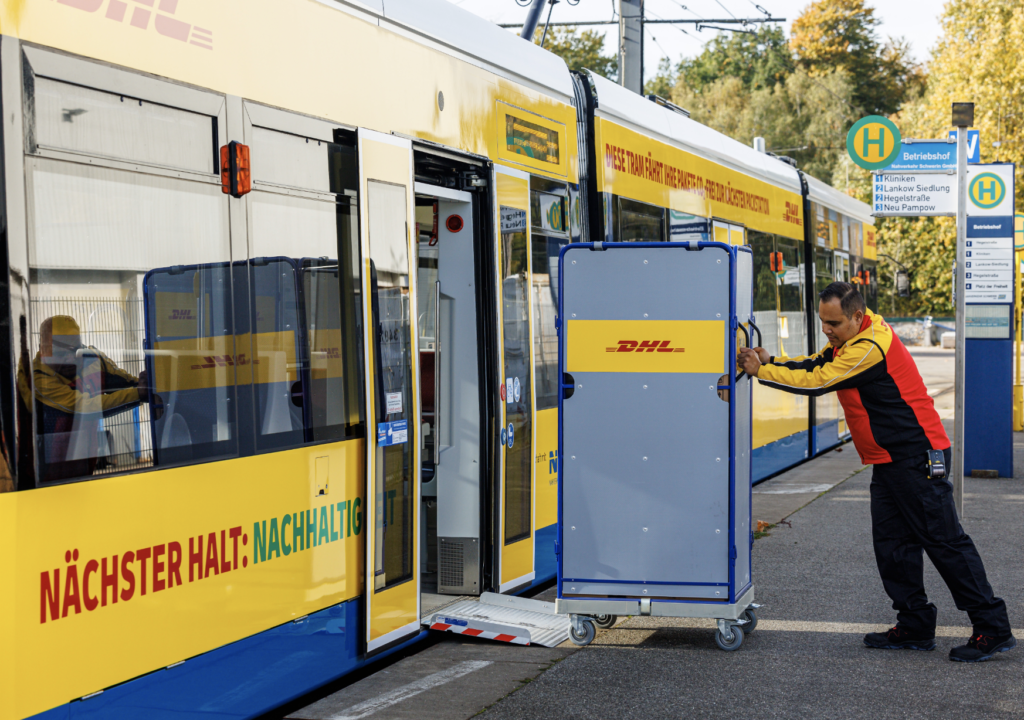Deutsche Post DHL Group officially launched parcel transport via parcel streetcar in the state capital of Mecklenburg-Vorpommern. Around 450 DHL parcel shipments will be transported on the new particular line in the city area every weekday. The additional trip starts at 11:17 a.m. at the Haselholz depot and stops at Kieler Straße, Platz der Freiheit, and Hegelstraße. Passengers are not on board.
At the stops, the shipments are distributed to packing stations. This intelligent concept saves emissions and reduces traffic in the city center. In addition, deliveries to the depot are made in a CO2-neutral manner using eco-electric StreetScooters.
The initiative is a joint project with the state capital Schwerin and Nahverkehr Schwerin (NVS). It is part of the “Delivery traffic of the future for the state capital Schwerin” project, whose goal is to implement environmentally friendly concepts for Schwerin’s delivery traffic by 2035.
Wilfried Schumann, Deutsche Post branch manager for Mecklenburg-Vorpommern: “A wonderful project. The parcel railroad in Schwerin brings to life what we are working hard for and what we firmly believe in maximum green, sustainable and innovative logistics and services of general interest for the region’s people. I am delighted that, with our strong partners, we have succeeded in getting this Germany-wide pilot project off the ground in Schwerin.”
Schwerin’s Lord Mayor Rico Badenschier emphasizes, “Schwerin is rising to the challenge of a sustainable design for delivery traffic. The parcel streetcar supports our efforts to achieve a traffic turnaround towards local public transport. With this project, which is unique in Germany, we are gaining experience that can be of great importance for many other municipalities.”
For Environment Director Bernd Nottebaum, the package streetcar is just the beginning. “During the development of the mission statement, many more innovative proposals from companies, logistics providers, and citizens of the state capital were collected in several workshops. They can be examined in the second project phase in the next two years and tested with federal funding.”
Wilfried Eisenberg, managing director of NVS, said at the commissioning ceremony, “The streetcar is Schwerin’s rice seal and connects this city sustainably, bringing it together and has done so reliably and electrically for 114 years. And, it can do more than transport people. Packages and parcels have a safe place in the streetcar with a good linkage of acting persons and ideas. Combining a stop with a parcel pickup or drop-off fits our concept of being a modern and sustainable mobility service provider.”

Reinhard Meyer, Minister of Economic Affairs, Infrastructure, Tourism and Labor of Mecklenburg-Western Pomerania, also welcomes the commitment of those involved in this project: “Climate protection is one of the most important tasks for the future. Mecklenburg-Western Pomerania should be climate neutral by 2040 at the latest. On this path, every single step counts toward achieving the goal. Parcel transport with the parcel train in Schwerin helps to save emissions. At the same time, it reduces delivery traffic in the city center. This further enhances the state capital as a place to live and work.”
The Schwerin parcel streetcar fits seamlessly into Deutsche Post DHL’s green sustainability strategy. The Group is already the most climate-friendly mail and parcel service provider in Mecklenburg-Vorpommern: with an e-delivery fleet of almost 500 e-vehicles and electric cargo bikes, especially e-trikes and e-bikes. This means that mail and parcel deliveries in around a third of the delivery districts are CO2-neutral.
Deutsche Post DHL Group invests heavily in sustainability. This year alone, it is investing around 600 million euros in electromobility and the construction or conversion of climate-friendly operating sites, for example, CO2-free delivery bases. To also become greener in the transport of shipments between parcel and mail centers, the Post & Parcel Germany division is also creating more than 400 (bio)gas-powered trucks over the next two years. And with new “GoGreen Plus” products, the company is offering customers the opportunity for the first time to manage and reduce their CO2 emissions generated during transport actively and to select climate-friendly transport by rail.
Picture: DHL Jens Schlueter

In short: By utilizing “Feeder RO-RO” carts, with (RFID/IoT/AI) options, including non-motorized cold-chain, the rail systems can generate fixed revenues, & contribute huge positive multiplier effects for regions & communities. The Common Denominator is a standardized “Feeder” roll unit for ease of handling, linking all requested points, taking advantage of “line-balancing” strategies not available in any other logistics design. The “Feeder” concept can be linked to networks for greatest efficiencies.